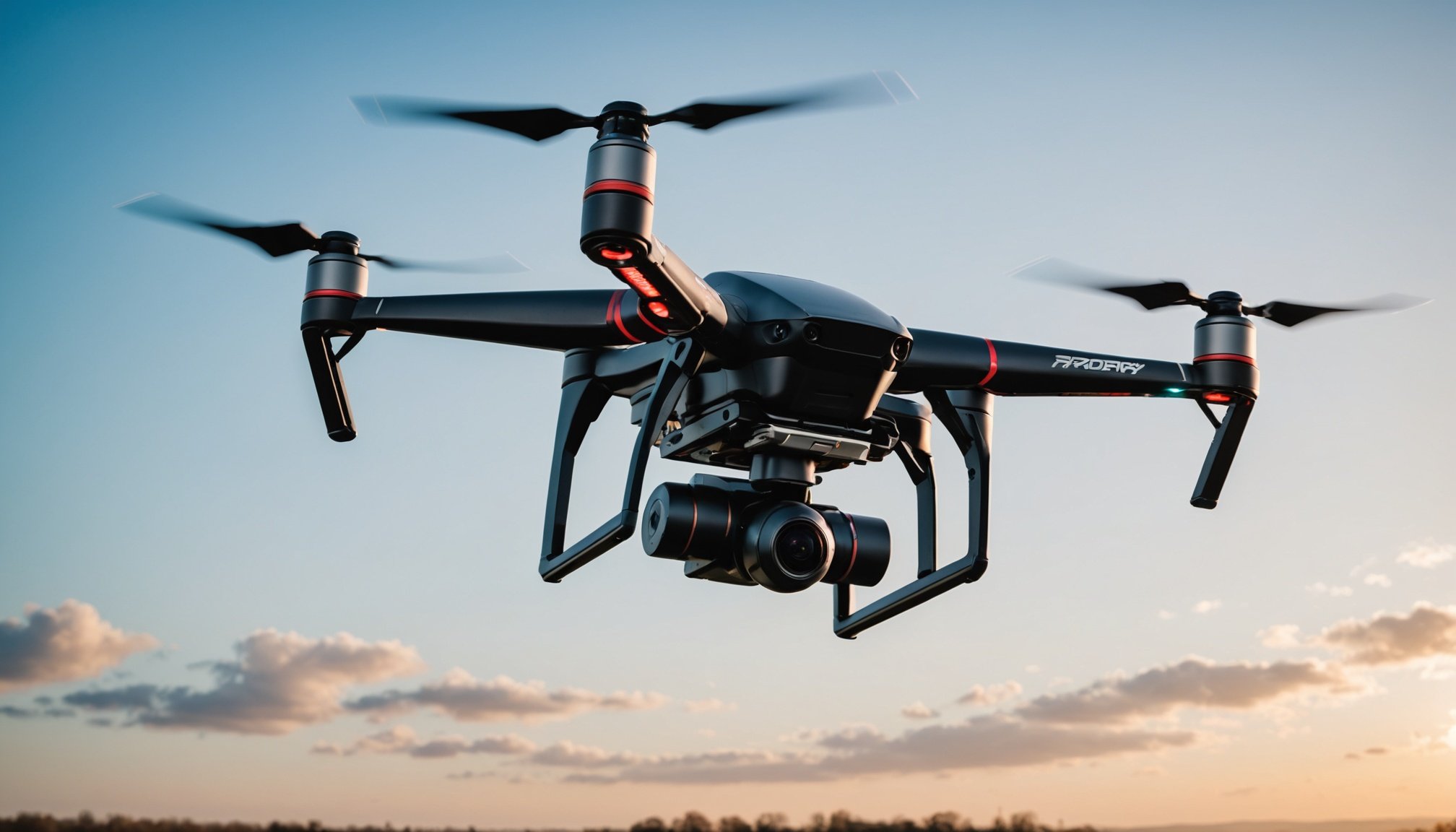Launching a Drone Photography Business in the UK
Starting a drone photography business in the UK requires thorough planning and understanding of specific market demands. First, the drone photography market in the UK is expanding rapidly, with growing demand from real estate, event documentation, and creative media sectors. Understanding this demand is crucial for positioning your business effectively.
Legal Requirements and Compliance
One of the first steps is familiarising yourself with the UK’s extensive regulations for drone operation. The Civil Aviation Authority (CAA) mandates that commercial drone users register their devices and obtain an operator ID. Additionally, receiving a General VLOS Certificate (GVC) is essential for operating drones within Visual Line of Sight. Compliance is crucial for avoiding hefty fines and ensuring safe operations.
Have you seen this : How to Launch a Renewable Energy Non-Profit in the UK: A Step-by-Step Guide
Recommended Equipment for Beginners
As for equipment, while starting a drone business, investing in reliable, entry-level drones such as the DJI Mini 3 Pro or the Mavic Air 2 is advisable. These models balance cost and functionality, offering features suitable for beginners. You’ll also need quality cameras, gimbals for stabilisation, and software for image editing to ensure professional-grade outputs. Venturing into this business demands both creativity and a comprehensive grasp of legal frameworks, establishing a foundation for successful operations.
Market and Business Strategy
Starting a drone photography business in the UK presents an exciting opportunity but requires a well-crafted drone photography marketing strategy. Identifying and understanding your target audience is crucial. Engage with sectors like real estate, large-scale events, and creative industries to cater to specific visual storytelling needs.
Additional reading : Master Guide: Mastering NCSC Standards for UK Cybersecurity Consultants
Identifying Your Target Audience
Understanding potential clients’ demands involves recognising their needs for unique aerial perspectives. Developing a client base starts with identifying industries benefiting most from aerial photo capabilities, such as real estate for showcasing properties or event organisers capturing comprehensive event footage.
Branding Your Drone Photography Business
Establishing a strong brand presence is key. Curate a robust online portfolio showcasing your best work on platforms like Instagram and Pinterest. This not only enhances visibility but also allows potential clients to see your style and capabilities.
Pricing Your Services Competitively
Setting your pricing competitively within the UK market involves analysing competitor rates and understanding value perception. Consider geographical location, project complexity, and client budget constraints. Position your services to reflect expertise and quality while being approachable to a wide range of clients, balancing between accessibility and profitability.
Marketing and Promotion
Getting noticed in the drone photography business in the UK hinges on effective advertising strategies and vibrant online presence. To start, a robust online marketing strategy is essential to enhance visibility. Online marketing strategies include SEO for boosting website traffic, engaging blog content showcasing expertise, and Google Ads to reach a broader audience. This will help potential clients discover your offerings effortlessly.
Next, leveraging social media for drone photography can significantly amplify your reach. Platforms like Instagram and YouTube are perfect for displaying stunning aerial visuals, attracting a dedicated following. Regularly posting high-quality images and engaging with followers through stories and live sessions can build a community around your brand. Encourage satisfied clients to share their experiences, expanding your reputation organically.
Partnerships can further enhance your business. Collaborate with local real estate firms or event planners for mutual promotion, offering exclusive packages or discounts to their clients. Attend local events or fairs with your drone setup to showcase skills in real-time and network with other professionals. These advertising drone services tactics not only solidify local business relationships but also attract more clients, cementing your position in the drone photography market.
Ethical Standards in AI for UK Companies
Implementing ethical AI standards in the UK is essential for companies aiming to maintain trust and legitimacy in the progressive digital landscape. As AI technologies advance, the significance of transparency and accountability becomes more pronounced. Companies are encouraged to develop systems that ensure users understand how decisions are made and who is responsible for them.
Transparency and Accountability
The core of ethical AI lies in transparent operations. Users should clearly know how data influences AI outcomes. For instance, using clear data visualization tools can enhance comprehension. Building accountability involves setting up robust frameworks where AI actions can be traced and evaluated. Clear reporting structures and openness regarding data usage policies are pivotal in fostering public trust.
Case Studies of Success
Several UK companies have successfully integrated ethical practices in their AI systems. For example, leading retail firms have implemented transparent recommendation algorithms that explain product suggestions to users. Financial services have adopted ethical AI audits to maintain integrity in automated decision-making processes. These organizations exemplify how ethical considerations can be seamlessly incorporated into AI-driven business models, paving the way for others to follow suit. By prioritizing ethical standards, businesses not only comply with regulations but also secure a sustainable operational framework.
Future Trends in Drone Photography and AI
As we look to the future, the drone photography industry is set to undergo significant transformations, driven by technological advancements and the increased integration of artificial intelligence (AI). Understanding these emerging technologies in drone photography is crucial for maintaining a competitive edge.
Integration of AI Tools
One key area is the integration of AI into drone operations, enhancing capabilities in image analysis and data management. AI can automate image sorting, improve quality through real-time enhancements, and even provide predictive analytics to anticipate client needs or market trends.
Predictions for Growth
The future of drone photography will likely see innovations in automation and image processing, leading to more efficient and intelligent systems. As AI continues to evolve, expect improvement in navigation and obstacle avoidance, enabling more complex shots and reducing operational risks.
Additionally, industry experts predict that AI-powered drones will play a significant role in industries beyond photography, like agriculture and surveillance. Embracing these technologies not only enhances your business’s capabilities but also positions it at the forefront of a rapidly advancing market, ensuring sustainability and growth in technology advancements.
Navigating Legal and Regulatory Frameworks
Navigating the legal and regulatory frameworks for AI in the UK involves understanding a dynamic landscape. As AI technologies rapidly evolve, regulations must grow concurrently to address new challenges. AI regulations in the UK oversee various domains like data usage, privacy, and ethical standards, ensuring responsible innovation.
Understanding Current Legislation
The UK’s AI regulations demand meticulous adherence to ensure conformity with ethical and legal standards. Key legislation such as the Data Protection Act and the GDPR outlines strict requirements for data handling, ensuring user privacy and consent. Businesses must stay updated on emerging laws to maintain compliance.
Importance of Data Protection
Data protection is paramount, as improper handling can lead to significant penalties. Compliance in AI requires implementing robust data security measures. Encryption, anonymisation, and thorough user consent frameworks are vital for protecting sensitive information and building trust.
Strategies for Ensuring Compliance
To ensure compliance, businesses should adopt comprehensive frameworks integrating legal insights with technology strategies. Regular audits and staff training can enhance awareness of compliance issues. Engaging legal experts to interpret complex regulations and developing a culture of ethical practice can streamline compliance efforts. This proactive stance positions businesses for success in navigating evolving regulations.









